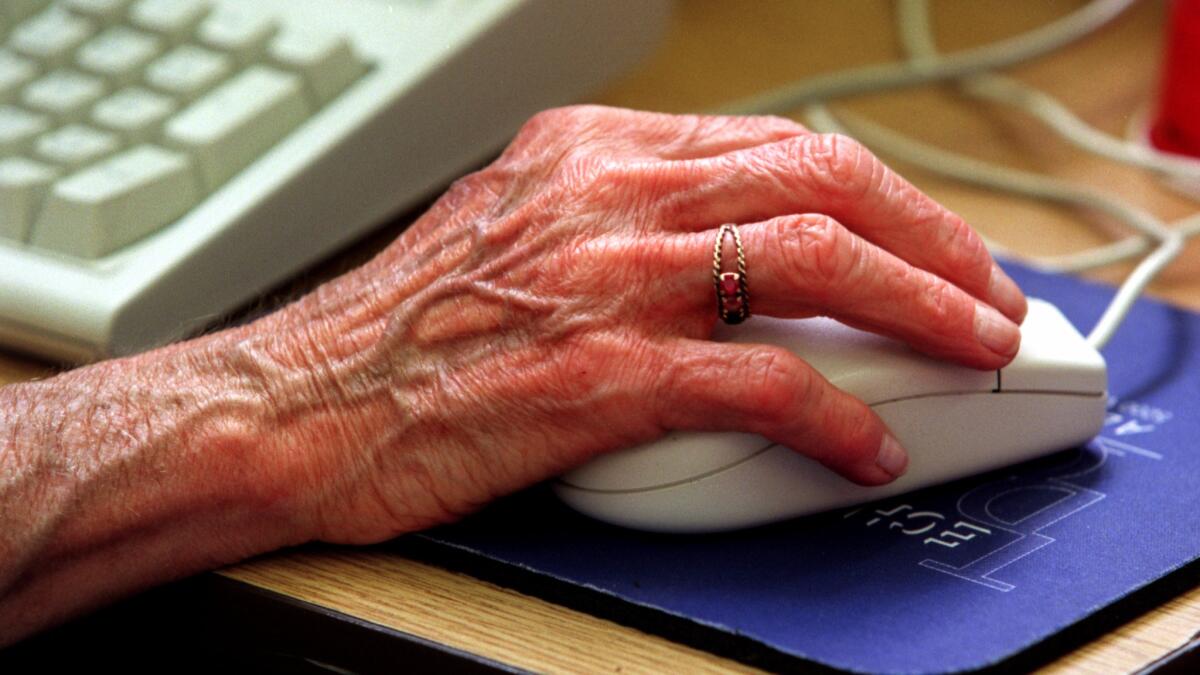Senior citizens rarely consult Dr. Google for medical advice, study says

- Share via
Senior citizens need more medical care than anyone else in the United States. And the Internet is chock full of health information. Yet seniors are far less likely than other adults to tap into it, new research shows.
A report published Tuesday in the Journal of the American Medical Assn. found that only about 18% of participants in the National Health and Aging Trends Study got health information online in 2014.
That pales in comparison with the approximately 60% of adults of all ages who have told the Pew Research Center that they consult Dr. Google at least once a year -- including the 35% who said they rely on the Web to diagnose their own ailments or the maladies of people they know.
See the most-read stories in Science this hour »
Since 2011, thousands of Medicare beneficiaries in the aging trends study have been completing annual surveys that gauge their use of technology. In the survey’s first year, 64% of the survey takers had computers and 43% were hooked up to the Internet. Their average age was 75.
Apparently, these seniors had better things to do than research ways to prevent heart disease, manage symptoms of diabetes or stave off dementia. Email was far more enticing. Electronic banking (but not online shopping) was also more popular.
Among all 7,609 initial study participants, only 16% said they went online to learn something about health. In addition, 8% said they filled prescriptions online, 7% used the Internet to get in touch with their doctors and 5% dealt with their insurance claims on the Web.
Altogether, 21% of seniors who were surveyed in 2011 used the Internet for at least one of these four health-related tasks, according to the JAMA report. By 2014, that figure rose to 25% — a small yet statistically significant increase, the study authors wrote.
Some senior citizens were more likely to go online for health-related reasons than others. For instance, the odds were twice as high for white seniors than for their black and Latino counterparts. College graduates were seven times more likely to handle health issues online than were seniors who didn’t finish high school. Seniors who rated their own medical condition as “excellent” were twice as likely to boot up their computers for the sake of their health than were seniors who rated their medical condition as “poor.”
These disparities -- along with the slow rate of uptake overall -- prompted the study authors to fret that seniors aren’t taking full advantage of the health resources available online.
“Digital health is not reaching most seniors,” wrote the authors, all from Brigham and Women’s Hospital in Boston. That means the Internet isn’t living up to its potential as a tool to “improve quality, cost, and safety of their health care.”
But perhaps seniors are right to eschew the health information available online. A 2014 study in the Journal of the American Osteopathic Assn. found that Wikipedia entries for nine common health conditions -- coronary artery disease, lung cancer, major depressive disorder, osteoarthritis, chronic obstructive pulmonary disease, high blood pressure, diabetes, back pain and high cholesterol -- contained a significant amount of information that was at odds with the latest medical research.
Follow me on Twitter @LATkarenkaplan and “like” Los Angeles Times Science & Health on Facebook
MORE IN SCIENCE
Will replacing thirsty lawns with drought-tolerant plants make L.A. hotter?
Deep space travel might blow your mind, but it could be bad for your heart
Scientists find microbiotic treasure hidden in the nose




